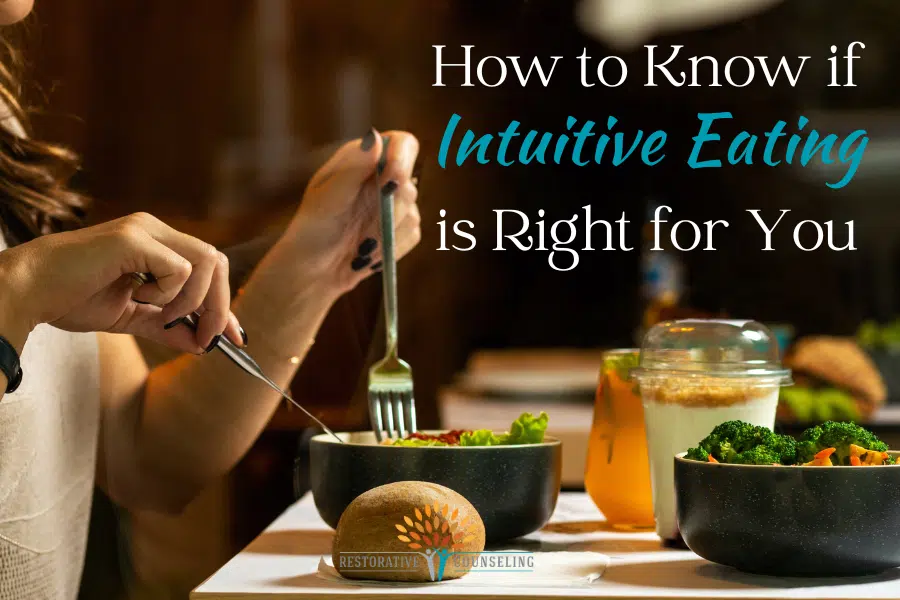Written by Katie Jackson-Griffin, LCPC
Are you finding yourself on what feels like a never-ending roller coaster with food and your body? The amount of messaging from peers, family, and the media about what is “healthy” can be incredibly overwhelming. It can feel like there are so many rules to follow. And some of them are even contradictory! You may find yourself wondering, “What truly is the best for my body? Low fat? Low carb? High protein? Vegan?” And around and around this cycle of questioning what is best goes. In your “health journey” search, you may have run into a concept called intuitive eating. Perhaps you’re feeling curious about it. Could this approach be right for you? Let’s take a look at Jamie’s health journey as an example.
Jamie’s Story
Jamie has struggled with her body image for as long as she can remember. As a child, she was told that she was “too big” and should “lay off the snacks.” She was put on a never-ending parade of diets to “help her get healthier.” Instead, what Jamie found herself doing was sneaking food at the end of the day and eating until she felt uncomfortably full. She would resist the urge to satisfy her hunger for fear of getting bigger. That only led to more swings back-and-forth between restriction and eating past the point of fullness. She felt out of control and thought the only answer was to find the right diet and “get some willpower.” By the time she hit her late 20’s, Jamie was exhausted of feeling out of control and anxious around food. In her research about dieting again, she discovered intuitive eating. She was skeptical, but felt excited at the prospect of achieving freedom from her preoccupation with food.
What is Intuitive Eating?
Intuitive eating is a framework to view food and eating that combines biological instinct, emotional needs, and facts about nutrition. It has 10 principles:*
- Reject the Diet Mentality: stop following strict diets
- Honor Your Hunger: notice when your body is hungry and eat
- Make Peace with Food: give yourself unconditional permission to eat
- Challenge the Food Police: no food is good or bad. It is neutral.
- Respect Your Fullness: listen to the signals that you are comfortably full and stop there
- Discover the Satisfaction Factor: enjoy the pleasure and satisfaction from food
- Honor Your Feelings without Using Food: find new ways to comfort your emotions
- Respect Your Body: body diversity exists, is important, and you can accept your body’s natural size
- Exercise—Feel the Difference: focus on moving your body to get benefits from it instead of trying to change your body size or use exercise as punishment
- Honor Your Health with Gentle Nutrition: notice how food affects your body as the unique individual you are and to honor your own health goals
These intuitive eating principles highlight how to listen to your body, your feelings, and what your personal health goals are. Each person is a unique individual so there isn’t a one-size-fits-all when it comes to eating.
Trying Intuitive Eating
Let’s return to Jamie’s journey. Reading these principles felt exciting and also very scary to Jamie. She had spent most of her life not trusting her body and instead trying to resist her impulses. She was afraid that if she “gave in,” she would “only ever eat junk food.” Following these guidelines was very different as she felt confused and overwhelmed about what to truly listen to at first: the diet thoughts or the intuitive eating principles. Jamie sought out help from a therapist and a nutritionist. They were able to help guide her on radically accepting this new framework for at least 6 months. Then she could re-assess to see what was and wasn’t working. Over time, Jamie found that she was increasingly less anxious about food. Eventually, she barely thought about it. Also, Jamie began to find joy in riding her bike and even noticed she was gaining some stamina and strength. Jamie felt healthy for the first time.
When might Intuitive Eating not be right for you?
There are some factors to consider to determine if starting intuitive eating may be right for you. It’s important to focus on your own health factors and needs. Here are some examples of when you might need more support before starting your own intuitive eating journey:
Struggling with an eating disorder
Those who are coping with an active eating disorder may not find intuitive eating to be the best fit right away. Food guidelines or principles can trigger more restriction for some. It’s important to find a provider or program that specializes in treating those with eating disorders prior to starting your own journey.
Managing a chronic health condition
Those with chronic health conditions that are affected by food such as diabetes, food allergies, IBS, etc. may also need support before starting intuitive eating on their own. It doesn’t mean that the framework won’t be useful for you. However, it is essential to work with a physician who is an expert on your condition to best understand how food affects your body. Once you have this knowledge, you can then apply the principles to fit your needs.
Intentional weight loss
Intuitive eating is not meant to be a diet and does not promote intentional weight loss. Everyone has the right to body autonomy. So, if you’re looking for intentional weight loss, then this approach wouldn’t be a good fit. Many diet programs will say they incorporate intuitive eating as it has become popular recently. However, dieting and intuitive eating cannot co-exist, so this is not possible.
There may also be other factors that you might want to explore before changing your relationship to food. Thus, it can be important to discuss your concerns and your goals with a health care provider before trying a new framework on your own.
Restorative Counseling can support you on your path to changing your relationship to food.
Overall, it can be overwhelming to work on your relationship to food and your body. You don’t have to do this alone. Our clinicians are here to help! The Restorative Counseling team recognizes the importance of honoring all aspects of your health. If you are interested in gaining support, schedule an appointment today.
*Source:
The Original Intuitive Eating Pros. (2019). 10 Principles of intuitive eating. Intuitive Eating. https://www.intuitiveeating.org/10-principles-of-intuitive-eating

Hi, I’m Katie!
I use HAES and DBT approaches to help people overcome their challenges with low self-esteem, anxiety, and depression. Read more about me.
Follow Restorative Counseling
Sign up for our newsletter

